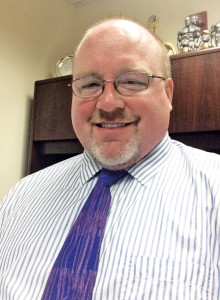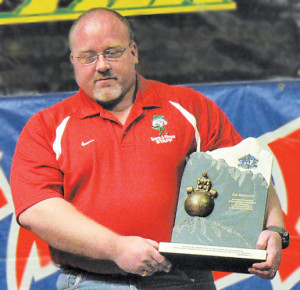
More Power to You

Dr. John Hudson is an English professor and coach of a powerlifting team.
by Donalevan Maines
Dr. John Hudson has better advice for gay teenagers than the hateful message he got from his pastor when he was fourteen. The United Methodist minister told young Hudson, “You really don’t need to worry about being a homosexual because you’re going to hell anyway.”
Hudson felt like dying.
A book saved his life.
The book was My Son Eric: A Mother Struggles to Accept Her Gay Son and Discovers Herself by Mary V. Borhek. Amazon.com calls it “a classic account of a mother’s struggle to understand and accept her gay son—from denial to reconciliation to activism. A touching and courageous true story, particularly useful for those parents whose religious backgrounds condemn homosexuality.”
“I ate it up,” says Hudson, an English professor at the University of Houston-Downtown and coach of the school’s world-champion powerlifting team. This fall, he was named director of UHD’s Center for Student Diversity, Equity and Inclusion.
Hudson, who is now forty-eight, grew up in northern Michigan, where Oklahoma City bomber Timothy McVey got his militia training. Recalling Borhek’s 1979 book, he explained, “It was the first time I ever heard anything positive about being gay, the first time I even had a thought in my head that you could reconcile being a person of faith and being gay.
“I really think it saved my life. I could have been a statistic. It changed my life. Before reading it, I didn’t have any hope for a future, and hope is a good thing. That book had to be there in my school library for a reason.”

It was especially surprising to Hudson because, in the late 1970s and early eighties, the only other books he could find on homosexuality were from the sixties, when psychiatrists still treated it as a mental illness.
Hudson remembered that groundbreaking book when he set out to write his dissertation at the University of Illinois on LGBT students’ perception of how LGBTs are treated in textbooks, and what a difference it could make for all students if the subject was treated fairly and comprehensively.
He began his research by interviewing a dozen LGBT students on campus. Invariably, they unconsciously accepted how textbooks mainly spoke about their lives in terms of the AIDS crisis. “During the course of the interviews, though, they would get angry, which confirmed what I had said all along: students were hungry for information,” says Hudson. “They didn’t even have access to information over the Internet because the school’s software blocked the information as pornography.
“One [gay student] told me that he was constantly in fear that it would be reported to his parents that he was searching online for information about homosexuality and that they would try to convert him to heterosexual behavior,” adds Hudson.
When Hudson set out to land a position as an English composition professor in 2006, he recalls saying, “With my LGBT dissertation, I just have to stay out of Texas and Utah.
“To my surprise, those were the first two states with schools that were interested and contacted me.”
Hudson accepted a post at UHD with a definite plan to start a powerlifting team. “If there was a gym on campus, I was going to start a club,” he says.

The reason is that, along with reading My Son Eric, joining the wrestling team and the powerlifting team at his high school helped Hudson combat the bullies who taunted him. “My U.S. history teacher talked me into joining the wrestling team,” he says. “He had a knack for picking out loners like me.”
After sticking it out for the first season, Hudson’s stepfather gave him another book that would alter the course of Hudson’s life. It was Inside Powerlifting by Terry Todd, a University of Texas product and former Olympic weightlifter.
The book’s summary says, “No sport relies so completely on strength or develops it so quickly as powerlifting…. As a way of taking a close look at this rapidly growing sport, the author asked nine of the world’s best powerlifters to share the secrets of their training.”
“I read that book over and over and over,” says Hudson. “I was never effeminate or flamboyant, but because I was never in sports, I was bullied like hell, and I figured that if I was in wrestling and powerlifting, I wouldn’t be bullied.”
In April, UHD Powerlifting won its fifth consecutive World Association of Benchers and Deadlifters (WABDL) national collegiate championship under Hudson’s coaching.
In September, about the same time that Hudson was appointed director of UHD’s diversity center, U.S. News & World Report ranked the college as the most diverse in the western United States.
However, Hudson acknowledges that having a diverse student population isn’t the same as having students who are educated in diversity. “Students can be tolerant until class is over; then they go home,” explains Hudson. “We needed to be proactive because there was always the potential for something terrible to happen.”
And indeed it did last spring, when gay activist Kristopher Sharp, planning to run for vice president of UHD’s Student Government Association (SGA), was targeted with fliers intended to torpedo his candidacy. On one side of the fliers was an “X” over his photograph beneath the caption “Want AIDS?” and above the message, “Don’t Support the…Homosexual Agenda.” On the other side was a copy of a medical record that identified Sharp’s HIV status as positive.
“The administration’s heart was in the right place, but it took that very terrible incident to give us some traction for them to understand the need for a chief diversity officer or diversity center,” says Hudson.
Meanwhile, Hudson asserts a profound and positive influence on peers and students with his integrity and faith. “I’m always out. I’m just me,” says Hudson. “I didn’t introduce myself as, ‘I am your gay coach.’” But when members of the team asked Hudson if he was married, they got the message that he’s gay when he replied, “No, I’m not allowed to marry [in Texas].
“One of them seemed really uncomfortable at first, but recently he suggested that the team get a float in the [gay pride] parade,” says Hudson. “He said he thought it would send a good message. Here’s a guy who didn’t know what to say the first time he met a guy I was with.”
In his new position as director of the school’s Center for Student Diversity, Equity and Inclusion, Hudson will develop programming that supports diversity and social justice, provide leadership that fosters a supportive and inclusive environment for all students, and oversee diversity trainings, mentoring, outreach, and advocacy. He also will play an active role in recruiting and retaining students associated with the Center and its diversity initiatives, and advise Safe Zone and other diversity-related student organizations.
“Dr. Hudson’s commitment to diversity and the success of all students—regardless of race, gender, or sexual orientation—is a tremendous strength for UHD,” said campus president Bill Flores. “I am confident that his leadership in this significant position will greatly enhance our diversity initiatives and further extend UHD’s reputation as one of the most diverse universities in the nation.”
UHD, founded in 1974, is one of four distinct campuses in the University of Houston System. It ranks as the second-largest university in Houston and the fifteenth-largest four-year public university in Texas. As one of the most ethnically diverse undergraduate programs in the country, UHD ranks thirty-third nationally for graduating Hispanic students, and thirty-seventh nationally for graduating African-American students. About two thousand students graduate from UHD each year. For more information about UHD, visit uhd.edu.
Donalevan Maines also writes about Elf’s Jeff Rizzo in this issue of OutSmart.











Comments